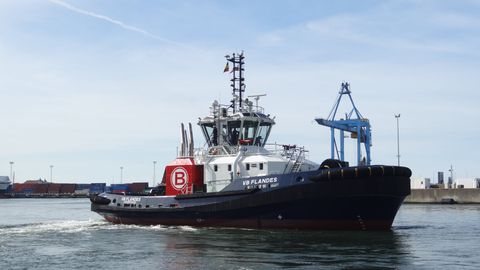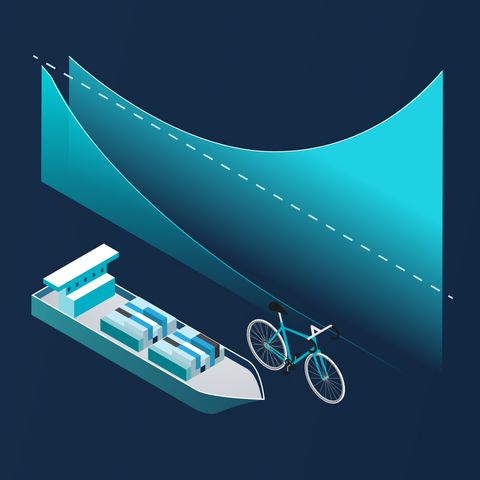
Boluda Towage is a part of Boluda Corporación Marítima, a family-owned company established in 1837. The company operates more than 300 tugboats, providing tailored towage services in major global ports.
The organization has long been a frontrunner in sustainability innovation. In 2012, Boluda Towage was one of the first to operate harbor tugs with a hybrid propulsion system. In 2020 it was the first towage company in Europe to convert an existing tugboat to comply with IMO Tier III standards. And since 2021, Boluda has been operating a tug fleet with NOx emissions cut by at least 80% per tug in the Port of Zeebrugge.
However, as Boluda Towage continued research into greener vessels and fuels, they realized that major breakthroughs to go to zero emissions would still be years away. And because of that, even their green tugs will not comply with stricter emissions regulations in the coming decades, due to the long lifespan of their vessels.
Using what they have in the water today as efficiently as possible
To future-proof the organization against even the most stringent possible regulation changes Boluda partnered with Onboard. Data from the Onboard Platform ensures vessels in the water today are able to be operated with the greatest possible efficiency. This enables Boluda to rapidly drive down emissions in the short term, while the global fleet is undergoing a shift to zero-emission fuels in the long term.
Building a complete picture of what is really happening across the fleet
With data from the Onboard Platform, Boluda builds a complete, accurate, and real time picture of what is happening on their vessels at all times. This includes recording all job activities - towing, mobilization, pinning, waiting, idle, plus planning details, pick-up and destination locations, quay information, pilot involvement, and towing operational details such as whether a tug is operating at the bow or at stern, what equipment is used, and so on.
Combined with the measurements that are automatically collected such as fuel consumption, speed, distance traveled, track, and so on, the result is a detailed operational data set that - with the integrated analytics capabilities - can be turned into port-specific key performance indicators and operational metrics.
With Onboard, Boluda is able to do a range of tasks to help their tugs run more efficiently and reduce emissions. This includes identifying waste activities, benchmarking jobs, discovering trends and patterns, and building custom visualizations. With these insights they can provide feedback and clear instructions to their entire nautical supply chain.
Additionally, the open nature of the Onboard Platform means it can be integrated with the tools that organizations already use in their day-to-day operation. For Boluda, this means they’ve integrated Onboard with TugVision, a system used to register towing jobs. This is important for two reasons; a) because it means the crew doesn't have to log in and switch between different applications and register the same information twice and b) it offers the opportunity to automate tasks such as planning and invoicing. Both of these advantages help improve productivity, as well as make life easier for the crew, freeing their time for other tasks, and keeping them happy on the job.
Driving down emissions by 20%, with another 10% expected soon
The most exciting result so far is that Boluda is seeing a decrease in fuel consumption of 20% across tugs that are outfitted with Onboard, within the first five months of operation. This has been realized due to a couple of key findings.
-
The biggest potential for fuel saving lay in mobilization rather than towing In fact, Boluda found that if a tug is called too late for a job, fuel consumption can be up to 2.5 times what it would be if it left at the appropriate time and sailed at the optimal speed to minimize fuel consumption. Increased visibility also revealed inefficient deployments, where vessels that are out and available are asked to return to berth while a vessel on standby at the berth is mobilized. Optimizing for both of these issues drove a sharp downward trend in fuel consumption.
-
Really understanding the port layout enables the most efficient use of tugs The Port of Zeebrugge is built into the sea, and strong currents force vessels to enter the port at relatively high speed. Although sailing distances for some quays are short and often smaller vessels are being moored at those docks, tight corners and short break paths mean bringing in vessels to these locations requires more power from their tugs. Boluda now has an understanding of what berthing areas are and aren’t efficient in terms of fuel consumption.
These insights have helped Boluda power big gains in collaboration with dispatch. As they begin to provide active feedback to other supply chain partners such as pilots, crew, and linesmen, they expect to slash fuel consumption by a further 10% - a remarkable saving on both emissions and costs.
Following initial gains of 20%, Boluda expects to slash fuel consumption by a further 10% - a remarkable saving on both emissions and costs.
What happens next
Over the long term, there are more applications and greater gains. Based on Onboard data, Boluda is already conducting research with the Port of Antwerp to identify the optimal location for a hydrogen station by analyzing heat maps of vessel movement within the port. The organization is also sharing emission data with their commercial department, since their customers are increasingly being expected to report on emissions as part of their own Scope 3 emissions reporting. And in the future, Boluda will purchase tugs based on these data and insights that are best designed for the layout of specific ports.
By Juli, Boluda aims to have the new technology implemented on a total of 17 of their vessels. Beyond the seven tugboats operating in the Port of Zeebrugge, they will add two in the Port of Antwerp, two in the Port of Ghent, and six in the Port of Hamburg.
Lower your carbon footprint with Onboard
Technology such as the Onboard Platform is enabling a range of organizations besides Boluda to see drastic and sustained reductions in their fuel consumption and emissions.
To find out more about how your organization could do the same, contact us.

